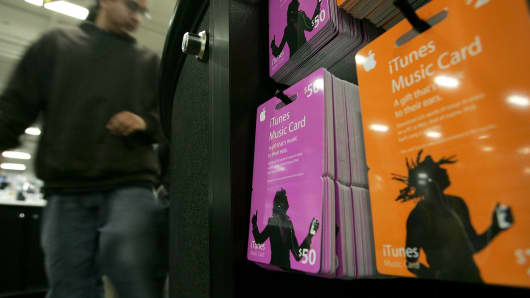You might find it bizarre that people are actually falling for the scam. Well, don't be. Taxpayers are taking the bait and losing significant amounts of money, according to the Treasury Inspector General for Tax Administration.
The Treasury Department reports that more than 10,000 victims have collectively paid in excess of $54 million as a result of tax phone scams since October 2013. Again, it may seem crazy, but the scams have been so successful that the Treasury Department was forced to issue a scam alert: "Any caller requesting taxpayers place funds on an iTunes gift cards or other prepaid cards to pay taxes or fees is an indicator or fraudulent activity," it reads.
Regardless of the reason for payment, the scam follows a precise formula: The victim receives a threatening call urging him or her to make a tax payment by purchasing iTunes gift cards from the nearest retailer. After the cards have been purchased, the victim is asked to pay by sharing the 16-digit code on the back of the card with the caller over the phone. Sending money through iTunes gift cards is like a wire transfer.
More from Advisor Insight:
Why investors can't gauge their own risk tolerance
Crazy tax moves clients wanted advisors to try for 2018
Don't put all your financial eggs in one investment basket
It's difficult to track where the cash goes after the gift card is drained. If you find out later you've been scammed for money, the chances that you'll get the money back that was on the card are slim.
I played along with the IRS phone scammer who recently called me for as long as I could. However, there was no way I was able to contain my laughter when he instructed me to pay my "back taxes" by purchasing an iTunes gift card. I did "offer" to pay with my credit card, but the scammer said it was too late for that. I was instructed to immediately buy an iTunes gift card and to stay on the phone the entire time; otherwise, "this final chance to avoid prison will disappear and the police will soon arrive and arrest" me.
Since I didn't comply, the "IRS" apparently issued an arrest warrant "on my name."
This was the ominous message left on my answering machine:
"Hello, this call is an official note from IRS, the Internal Revenue Service. The reason of this call is to inform you that IRS is filling [sic] a lawsuit on your name because you have tried to do a fraud with the IRS and we are taking illegal [sic] action and we are issuing a legal arrest warrant on your name. To get more information regarding this case file, just call us back on our department number, 708-432-8161."
I called the number and started going through a menu of options and was actually transferred to a call center where a man began discussing my "case file" so he could help me avoid a lien being placed on my assets. I asked whom I was speaking with and also pointed out he had no idea whom he was talking to, because he never even asked my name — so how could he possibly know my "case file"?










